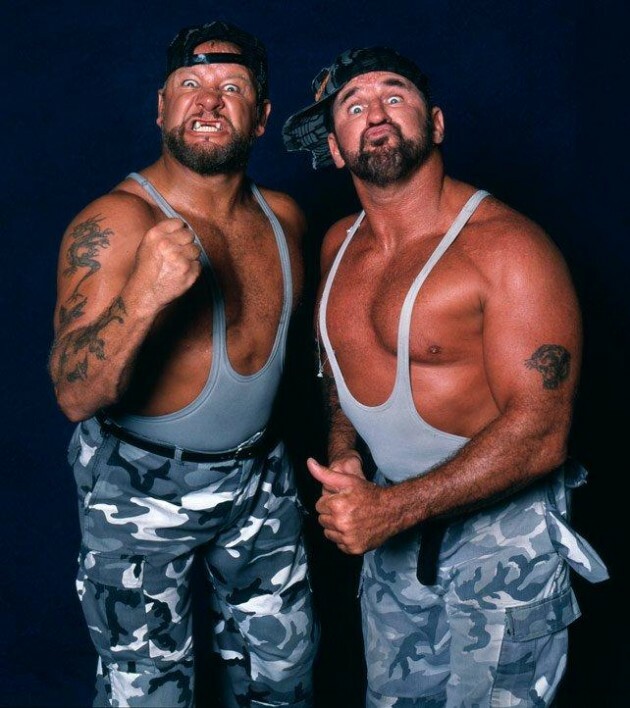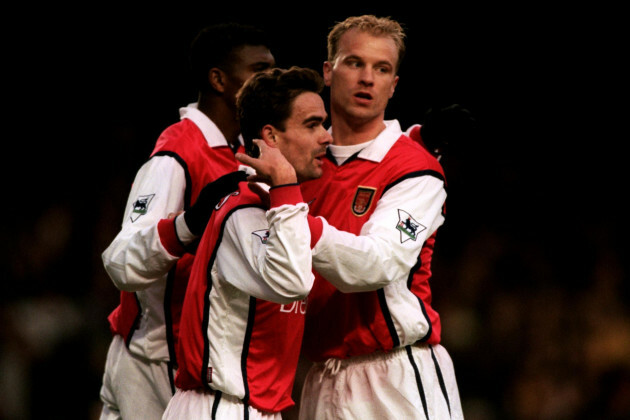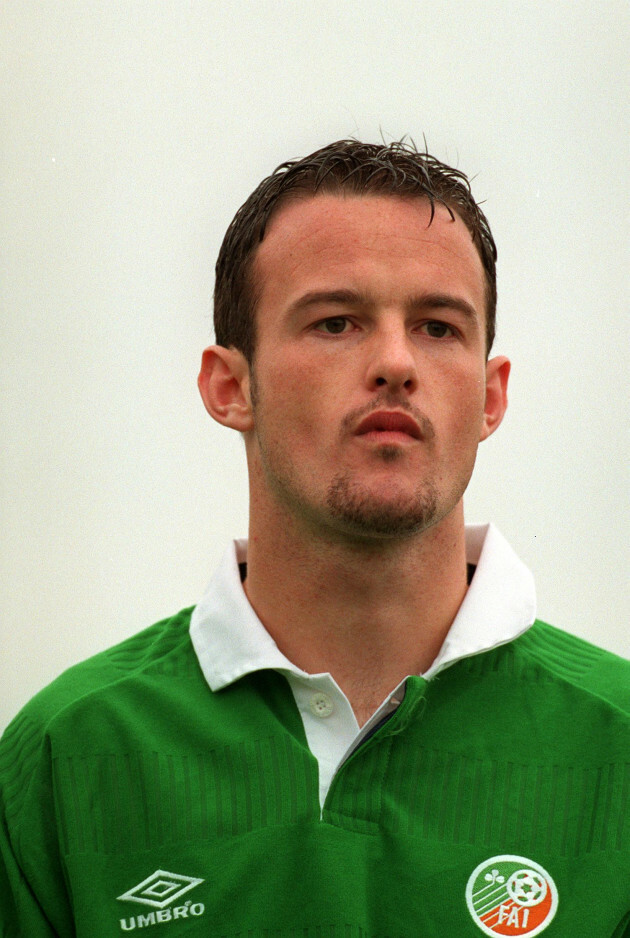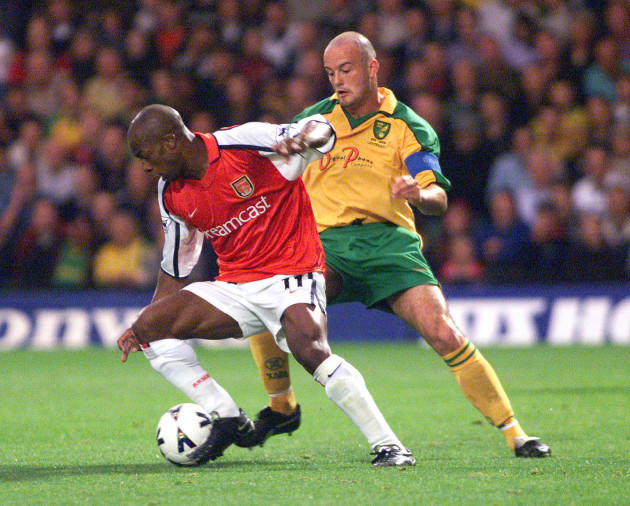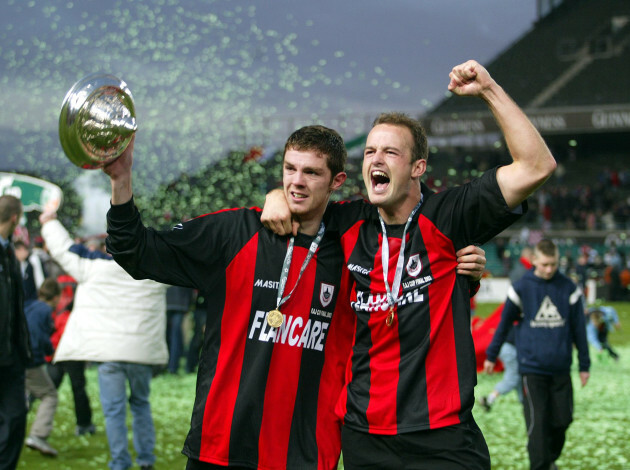THERE’S ONE DISTINCT memory Brian McGovern has of Arsenal interim boss Freddie Ljungberg.
“He was always into his fashion”, he begins.
“One day he came in wearing a pair of dungarees and no top on. You know the Bushwhackers, the baldy lads doing the wrestling? He looked like one of them.”
“Freddie liked to make a fashion statement but could back it up. A decent player. Looking back, he was an icon because nobody was like him. He was his own product. He wasn’t trying to copy anyone. And a lot of footballers try to copy other footballers. But Freddie was always himself. People followed him. So he was a leader in that way. But will he keep the Arsenal job? No. Football management now is a pain in the arse because you’re a people manager and a multimedia manager. It’s not just about football. It’s about managing multiple personalities who are on millions more than you, and probably think better than you. It’s a very, very difficult job.”
Ljungberg is the latest of a number of Arsene Wenger’s former students to move into the management world. Tony Adams, Patrick Vieira and Thierry Henry have experienced varying degrees of success while the likes of Marc Overmars and Dennis Bergkamp have been involved in slightly different roles.
McGovern played alongside all of them during a four-year stint with Arsenal. He was captain of the reserve team for a large chunk of that period and when he made his Premier League debut in May, 2000 as a second-half substitute in a 4-2 defeat against Newcastle at St James’ Park, it came just three weeks after he’d led out the Republic of Ireland Under-21 side against Greece.
It seemed the graft was starting to pay off.
And then, just like that, he was gone.
And he was on the hamster wheel again.
“There’s no moment where I think, ‘Right, that was a mistake’”, he says, defiantly.
“And it was a blast, I have to say. Like, I thoroughly enjoyed every second. From Crumlin to Cherry Orchard to Arsenal to Ireland and everything after that. I have a mate who’s a mad Arsenal fan and he said to me recently, ‘You should feel privileged’. And I am. Such a big club…The likes of Adams, [Ian] Wright, Bergkamp, Vieira…I played in so many games with them. It was nothing to me. Every week – whether it was Bristol or Liverpool or Everton – those were the players I was around regularly.”
“I watched that goalkeeper [David Martin] the other day, who was playing in the Premier League for the first time. It was his first start and he’s 33. He’d never got a chance. How many reserve games has he played? It was so emotional for him and his father. It took him that long. And that’s a little bit like how I gauge my career.”
McGovern was a strapping centre-back and spotted as a teenager while playing with Cherry Orchard. Arsenal scout Bill Darby liked what he saw and passed a glowing report to Liam Brady, then relatively new in his role as Head of Youth Development at Highbury. Soon enough, Brady was having tea and biscuits in the living room of McGovern’s family home on Captain’s Road (the posh end) in Crumlin.
“There was myself and another player called Alan McNevin and we ended up going down to one of the hotels in Ballsbridge – I think it was the Burlington – and Brady produced the contracts”, he remembers.
“He said he’d give us a year each. I was heading into my Leaving Cert year and the Ma said no and the Da said, ‘You’re definitely going’. I think he was trying to get rid of me. But we went over, got the head down and grew up very fast.
“You could say it was a rollercoaster but at the time, Irish lads were going here, there and everywhere. Davy Freeman went to Forest, there was Andy Reid, Richard Dunne, Stephen McPhail… Those were the circles we moved in. Everyone was going on trial. And even with the Orchard, we went to the Milk Cup and the big thing was all of the media attention on Joe Cole. Everyone was talking about him. And I was like, ‘Who’s he?’ It really meant nothing to us. I remember we played Borussia Dortmund and we did really well against them. We were raw, but really good. We were a top team. So I don’t think the trials fazed us at all. It just seemed pretty natural.”
In north London, it was survival of the fittest. Competition was intense, particularly with Arsenal’s underage setup boasting quite a few graduates from the FA’s School of Excellence at Lilleshall. Unhelpfully for McGovern, some – like Lee Canoville and Matthew Upson – were centre-backs. He handled himself well but at the end of his first season, still faced into the genuine possibility of being culled.
And there was a ruthless ritual at Arsenal.
“We all got told in a canteen with a revolving door”, he says.
There was fourteen of us sitting at a table. Inside the room was Don Howe, Don Givens, Liam Brady and a few others. So, you’d go in one door with a cup of tea and fellas were coming past you on the way out. And they were either crying or delighted with themselves. I remember one fella was in bits, absolutely bawling his eyes out. And he says to me as he’s walking past, ‘They said we can go back training if we want…or we can just go home’. And I’m thinking, ‘Fuck, I’m in there in a minute’. Alan [McNevin] went in ahead of me and it was a ‘no’. He didn’t get a contract.”
“He was a good player but it just didn’t work. I remember he had a bit of a pow-wow with Brady during one game. He wasn’t playing the best and Brady came in at half-time and was giving out. I remember him saying to McNevin, ‘You’re going home. You’re on your way out’. And we started the second half, McNevin took two or three touches and put it in the top corner. And he kinda went after Brady saying, ‘Who’s going home?’ Now, he ultimately did. But the authority figures didn’t really like to be questioned. And there were six or seven fellas ready to come through behind you. After my second year, I realised, ‘Fuck, I’m just a number here. They’re getting fellas in from all over the place’. You went to training and there’d be two new lads. And the first thing you’d always say was, ‘Where do yous play?’ And if they said up front or midfield, you were grand. You didn’t give a shite. But in a week, you were guaranteed three or four players coming in for trials who were the next big thing.”
“I managed to get another year. I had no agent so if I knew then what I know now…But looking back, I’m glad the way I did it. It was the hard way. I never got a massive signing-on fee. It was normal wages. But if someone was there alongside me saying, ‘Let’s get him down to Bournemouth for six or seven games’ and then my value would have increased, maybe? But I didn’t know any of that. I just hadn’t got a clue. Now, it does make you work harder because you can get comfortable. But, when you’re doing well, you’re at the top level and you think you’ll get a chance. And then the gaffer goes and signs two new centre backs. And you’re thinking, ‘Well, he’s bought this fucker for £4m? What am I worth? Nothing’. And you start to have doubts about yourself. Then he has to justify signing the expensive new players and can’t put them in the reserves. And you go down the pecking order again.”
“But when you get to the third year, you become more aware. You’re thinking, ‘What’s my value? Am I doing something wrong?’ Players are getting £100,000 per week. And you’re saying, ‘I’m working my balls off and this lad gets £99,000 more than I do?’ You didn’t want people to take the piss. And football can be a bit like that.”
Still, even without first-team opportunities McGovern was immersed in first-team training every day. He progressed to consistently rubbing shoulders with some of the most elite players in the world. And owing to his status in the group, he was afforded extremely special opportunities.
“We had a reserve game in Boreham Wood one evening and I was captain”, he says.
“John Lukic was in goal and the back-four was Nelson Vivas, Tony Adams, myself and Nigel Winterburn. This was the reserves. Up front, [Nwankwo] Kanu came on to make his debut on a real mucky pitch and he was shit. We were all looking at each other and thinking, ‘Who the fuck is this?’ But it showed that it takes everyone some time to adapt and in a few months he was amazing. Seeing him on the training pitch, he had such great technical ability. And there were so many stars.”
“Bergkamp, Overmars – they always get the spotlight. But, there were fellas like [Gilles] Grimandi in midfield too. Just terrific players. Some people will say that training is different because there’s no pressure. But take something like a crossbar challenge. These lads would hit it, it would come back to them and they’d hit it again on the volley. It was a double crossbar challenge. Just a different level. And a lot of people don’t understand. I don’t really talk about it. Sometimes people want to chat but it’s almost to justify talking about football when they really haven’t got a clue. It’s only when you look back at the people you played with and it’s frightening. One game we played against Tottenham and there was about 6,000 at it. For a reserve game? You think about it sometimes…maybe if I’d been at a smaller club, would I still be digging out a career? But you can’t tell. I just rolled the dice and went with it.”
I bought a car when I was seventeen. It was a brown, rusty 1983 Vauxhall Nova. The speakers in the back window were worth more. I went down to Argos, got the speakers, cut the panels out and put them up. I drove it into the training ground and all the first-team players came up shaking my hand and high-fiving me. ‘Oh, you crazy Irishman. We fucking love it’. And I’m thinking, ‘What do you love about it?’ They thought I was messing, acting the bollix and buying this piece of shit. It was what I could afford. You looked around the car park and there was a Lotus Ferrari, BMW, Mercedes and my ’83 Vauxhall Nova. But it didn’t mean anything to me. And people ask me if I was in it for the money!”
Some memories are less sweet than others and there was one harrowing moment for McGovern in a reserve game that ensured he was on the sidelines for a prolonged period, an incident that he dwells on even now.
“I was in Boredom Wood and I was knocked out cold”, he says.
“My tongue was rolled back in my throat. Colin Lewin (former Arsenal physio) joked with me afterwards because I had bitten down on his finger. But I hadn’t got a clue. For about a year I was between Harley Street and London Colney doing nothing because of a contusion on the brain. And that scares you. Like, it’s 3 o’clock in the morning and you’re getting an MRI and hearing people around you saying, ‘It could be a bleed on the brain’. And you’re thinking, ‘That’s not good’. I had to go to specialist after specialist. Balance tests. But what got me through was my reading of the game. I could put two and three people into place. Almost like a chess game. I was astute like that. How a game was developing. I could close down play before something happened. That side of my game was always strong. And general fitness. I was one of those raw Dublin lads who’d run all day. If a tackle was 60-40, I’d still win it for you.”
McGovern’s mentor was reserve boss Geordie Armstrong, who was always there to offer a word of encouragement and who found his uncompromising centre-back’s needle and aggression pretty charming, even when others didn’t necessarily feel the same way.
“I didn’t ask anyone to do anything I couldn’t do myself”, McGovern says.
I’d run harder, longer, faster. I’d tackle and didn’t give a shit who you were. I remember having a fight with Vieira and getting sent back down to the reserves because of it. We were tearing the bibs off each other during a game. The two of us went in for a tackle and he pulled the top off me, I pulled the top off of him and I ended up getting the bullet. If you have a name for yourself, it doesn’t mean anything. Some lads were saying, ‘That’s Vieira’. My attitude was, ‘I don’t care who you are’. You’d always get sanctioned if something happened in training but then you’d talk to Geordie afterwards and he’d say, ‘Good lad. Nothing wrong with a bit of that. Shows a bit of passion’”.
That attitude and talent got him in the squad for the first-team’s trip to Newcastle on 14 May, 2000. With a Uefa Cup final against Galatasaray a few days later, Wenger rested many of his big names but McGovern still shared a pitch with Davor Suker, Nigel Winterburn, Martin Keown, Kanu and another up-and-coming youngster named Ashley Cole when he entered the fray as a second-half substitute.
“All my mates were finished school and doing trades and would say, ‘Jaysus, you’re playing with this fella or that fella’ but I never treated anyone differently”, McGovern says.
“I remember Lee Dixon coming in and looking for concealer because he had a spot on his face. I had a bit of craic with him about it and lads were saying, ‘Don’t be slagging him’. And I was like, ‘Don’t be slagging him? What do you mean? Looking for concealer? The auld one’. I don’t know if I gained respect from the lads because of that.
But I do remember getting into trouble at the Newcastle game because Sir Bobby [Robson] came out and I was like, ‘How’s it going?’ And people were saying, ‘It’s SIR Bobby’ and I was saying, ‘Well, he’s not my Sir’. That’s the way it was and people wanted to bow down. I know you have to have certain airs and graces but at the end of the day, he’s just your gaffer, isn’t he?”
At that stage, McGovern had also captained the Republic of Ireland Under-21s and he seemed on the cusp of substantial progress.
“It was a game against Greece and it was a massive honour”, he says,
“It was surreal. A moment you’ll never forget. People might say, ‘Ah, it was only in Newbridge’. But it could’ve been in Le Fanu Park in Ballyfermot. It didn’t matter. I was playing for Ireland. You put that jersey on and in your head you’ve made it.”
But within a few weeks, he was at a different club and starting all over again.
“It got to a crossroads”, he says.
“We came back for some behind-closed doors games and one of them was against Norwich. About two weeks later, I was told to head up to Norwich. So I drove up, into the training ground and it was, ‘Alright, you’ve signed on loan’. That was it. Done. No agent. Nothing. That became a permanent deal in the August and then about two months later, [Bryan] Hamilton was gone as manager. I’d sit in a room with Nigel Worthington (who replaced Hamilton as boss) now and we’d have the craic. But when he brought me into his office, he said, ‘You’re a big fuck. I don’t know what he [Hamilton] signed you for. I don’t want you so if you want to sign for someone else, off you go’. And I said, ‘I’ll prove you wrong’. And he goes, ‘Okay, go and do that’. So I played a few games and I wasn’t his favourite. But then it was my second season and I was number 15. Worthington said, ‘I’ll give you the number 2 shirt and play you at right-back because Darren Kenton is off to Southampton’. But the move didn’t go ahead and I got injured. I’d been thinking, ‘I’m in here – I’ll slot in and get the head down and play every week’. And then the injury came, he brought in a few lads on loan and again it was a case of, ‘Where the fuck did this fella come from?’ In football, there’s always a revolving door.”
“But there were some good days at Norwich. I remember a pre-season friendly against Arsenal and I played super that day. I was on fire. They had Sylvain Wiltord, Henry was playing, Vieira too. And then Celtic came down for a game and you’re playing against Henrik Larsson. And I excelled, you know? And not many can say that they’ve trained with Overmars and Bergkamp and played against the likes of Larsson and Alan Shearer.”
“But it’s a fickle thing. The time on top of the pedestal is very brief. When you’re up there, you’re flying. But all I can say is that when I was up there I looked after everyone. I was never a prick to anyone. That transition was a lot easier for me. I know players who never made it but think they have. They think they’re something and alienate their friends and family. And it’s a hard fall. Psychologically, it’s really hard for them.”
For me, I did what I could do at the time. The proudest moment was when I brought the whole family to Euro Disney. I bought my Ma a car. I bought my brother a car. Looking back on those things is lovely. My brother was only seventeen and had his motor, fully insured and that got him up and down to get his trade. And when you look back on doing things like that, you realise you did something right. At least I looked after the family.”
After Norwich, McGovern had a stint with Peterborough before returning to Ireland with St. Pat’s. From there, it was off to Longford, with whom he won an FAI Cup in 2003, before a short spell with Bray Wanderers.
He’s now based in Wexford with his wife, Nicola, and children. He runs his own fitness and conditioning studio that boasts a range of clients.
Still, there’s an itch. When it comes to football, he has an astuteness. A way of reading the game. And maybe he’s not quite done with it just yet.
But regrets? Not really.
“I’m blessed here now but I’d definitely like to get back across”, he says.
“It’s a different beast and it’s ultra professional.”
“In terms of regrets, I’d have loved to have played more games. You’re fit and ready and in the tracksuit. But you’re on the bench or you’re eating chicken goujons up in the suite. I didn’t want to be eating chicken goujons and watching a match in a glass box.”
“If I had someone to look after me…someone more knowledgable who had my best interests at heart. You’re young and naive. Then you start talking to other youth team players and they’ll say, ‘They (the club) got a house for my Ma and Da down the road’. And you’re saying, ‘What?’ And you learn that there are ways around signing-on fees. I would’ve liked a house for my Ma and Da in London!”
“But I haven’t suppressed the memories but when you talk about it, it’s that little reminder. ‘Yeah, I did that’. And it’s pretty cool.”
The42 is on Instagram! Tap the button below on your phone to follow us!
